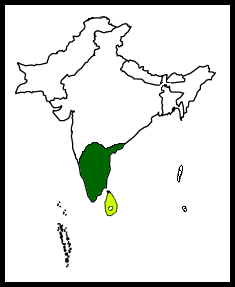Sbarnhardt (talk | contribs) (Move Mike Barth image up to the top) |
(→External Links: VSearch added. 1 added to GSearch Checked template) |
||
| Line 52: | Line 52: | ||
==External Links== | ==External Links== | ||
{{GSearch|"Argya affinis" {{!}} "Turdoides affinis" {{!}} "Yellow-billed Babbler"}} | {{GSearch|"Argya affinis" {{!}} "Turdoides affinis" {{!}} "Yellow-billed Babbler"}} | ||
| − | {{GS-checked}} | + | <br /> |
| + | {{VSearch|"Argya affinis" {{!}} "Turdoides affinis" {{!}} "Yellow-billed Babbler"}} | ||
| + | {{GS-checked}}1 | ||
| + | <br /> | ||
| + | <br /> | ||
| + | |||
[[Category:Birds]] [[Category:Argya]] [[Category:Maps]] | [[Category:Birds]] [[Category:Argya]] [[Category:Maps]] | ||
Latest revision as of 19:26, 3 June 2024
Alternative name: White-headed Babbler
Disambiguation: White-headed Babbler is seen as both an alternative name for the Yellow-billed Babbler, Argya affinis and a species name for White-headed Babbler Turdoides leucocephala.
- Argya affinis
Turdoides affinis
Identification
23 cm
It has short rounded wings and a weak flight.
These birds have grey brown upperparts, grey throat and breast with some mottling, and a pale buff belly. The head and nape are grey.
The race T. a. taprobanusi of Sri Lanka is rufous beneath, and more heavily streaked on the throat and breast.
Similar Species
The only other Turdoides-babbler with a yellow bill in the region is the Jungle Babbler. It has pale yellowish eyes and no pale wing panel.
Distribution
| The Yellow-billed Babbler is a common resident breeding bird in Sri Lanka and southern India. Locally common or abundant. | |
| Legend • T a. affinis; year-round |
Taxonomy
This is a polytypic species[5] consisting of 2 subspecies.
Subspecies
- A. a. affinis:
- Arid lowlands and foothills of southern India
- A. a. taprobanus':
Habitat
Its habitat is scrub, cultivation, open forest, orchards, gardens. Usually found in drier habitat than Jungle Babbler.
Behaviour
The Yellow-billed Babbler lives in flocks of seven to ten or more which is why it's called "Seven Sisters" by locals (but this name can also refer to Jungle Babbler).
Breeding
Breeding season is all year, but most birds breed between March and November in India and between November to March in Sri Lanka. It builds its nest in a tree, concealed in dense masses of foliage. The normal clutch is two to four greenish blue eggs, although up to five may be laid by birds in the hills of Sri Lanka.
Diet
It feeds mainly on insects, but also eats fruit. The birds forages mainly on ground, occasionally they are seen flycatching.
Vocalisation
It is a noisy bird, and the presence of a flock may generally be known at some distance by the continual chattering, squeaking and chirping produced by its members.
Movements
Resident species.
References
- Rasmussen, P.C. and Anderton, J.C. 2005. Birds of South Asia. The Ripley Guide. Washington D.C. and Barcelona: Smithsonian Institution and Lynx Editions. ISBN 84-87334-67-9
- Grimmett, R., Inskipp, C. and Inskipp, T. 1998. Birds of the Indian Subcontinent. London: Christopher Helm. ISBN 0-7136-4004-9
- Kazmierczak, K. and van Perlo, B. 2000. A Field Guide to the Birds of the Indian Subcontinent. London: Pica Press. ISBN 0-300-07921-4
- del Hoyo, J., Elliott, A. and Christie, D.A. eds. 2007. Handbook of the Birds of the World. Vol. 12. Picahartes to Tits and Chickadees. Barcelona: Lynx Edicions. ISBN 84-87334-30X
- Clements, J. F., T. S. Schulenberg, M. J. Iliff, S. M. Billerman, T. A. Fredericks, J. A. Gerbracht, D. Lepage, B. L. Sullivan, and C. L. Wood. 2021. The eBird/Clements checklist of Birds of the World: v2021. Downloaded from https://www.birds.cornell.edu/clementschecklist/download/
Recommended Citation
- BirdForum Opus contributors. (2025) Yellow-billed Babbler. In: BirdForum, the forum for wild birds and birding. Retrieved 15 January 2025 from https://www.birdforum.net/opus/Yellow-billed_Babbler
External Links
GSearch checked for 2020 platform.1






